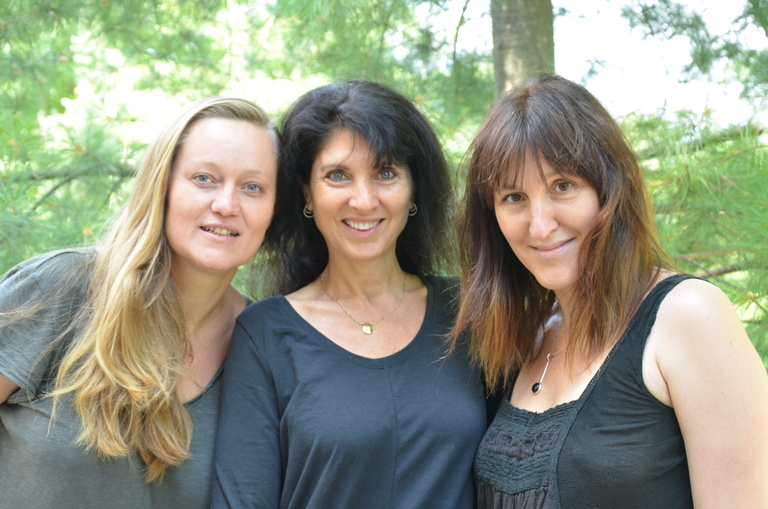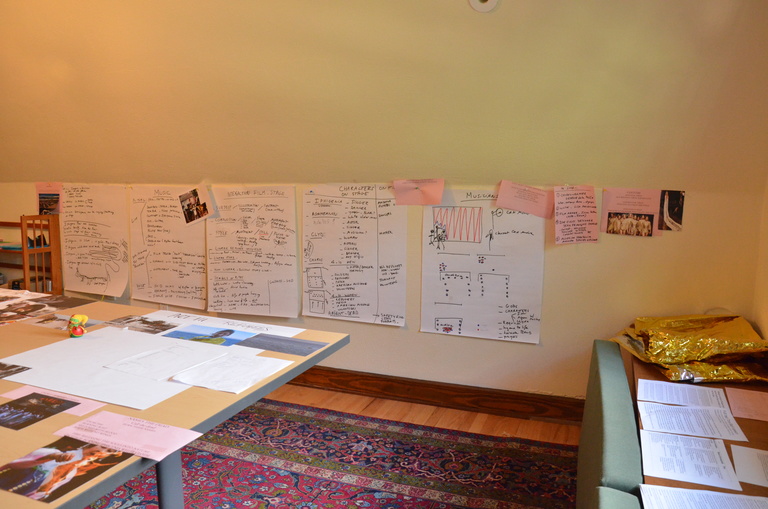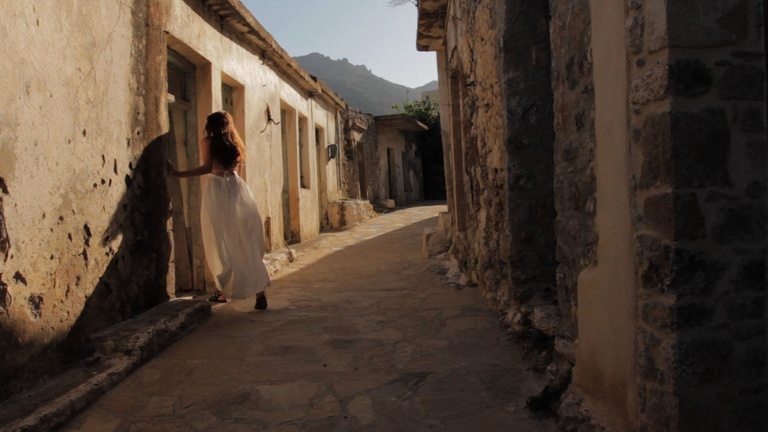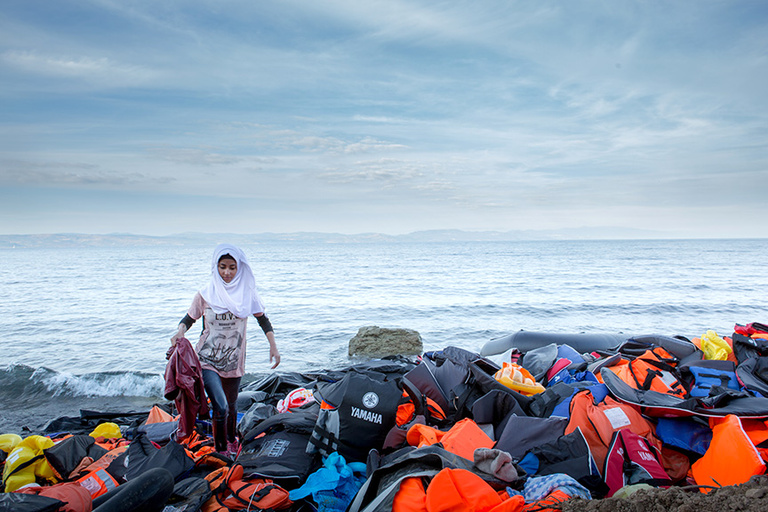
“We don’t collaborate, we collide!” declares Irina Patkanian as she sits down for a conversation with fellow artists Lisa Schlesinger and Marion Schoevaert to discuss their Iphigenia Project and its culminating piece, Iphigenia at Lesvos: Story of a Refugee. The project has been unfolding for several years and reflects not only current world events, but the three women’s process-oriented working styles.
Schlesinger, a faculty member in the UI Theatre Arts Department, is a playwright whose work has long been political and is often removed from physical space of the theater. For example, a piece she did in occupied Palestine in 2011, A Dream of the Sea, took the form of a performance parade through the streets of Ramallah. It didn’t involve dialogue or trained actors or even text. And, she laughs, “It could have failed so bad!”
Bold Risk-Taking Common to Three Artists' Work
Risk-taking and art that responds to the moment is central to this trio's work. They spent a month at the Obermann Center last summer as part of the Interdisciplinary Research Grant program. (Applications for this program are currently open through November 14.)

During their month-long residency, Schlesinger wrote; Patkanian, a Russian-born filmmaker, edited footage she’d taken in Greece two summers before; and Schoevaert, a French theater director, commandeered the Center’s attic, where she created storyboards that mixed stills from the Patkanian’s footage with a panoply of images, including George Bush announcing Desert Storm, Syrian wedding rituals depicted on ancient vases, and a photo of fashion models wearing short golden dresses. The latter echoes the flyweight thermal blankets given to refugees just after landing, one of which Patkanian brought back from Greece and brought to the Obermann Center to inspire their summer work. The trio frequently worked ten-hour days, intent on taking advantage of their being under the same roof and being able to quickly bounce ideas off one another.
Sacrificed for War
At the center of this audacious project is Iphigenia, the mythological daughter of King Agamemnon and the heroine of two plays by Euripides. En route to Troy at the beginning of the Trojan War, Agamemnon angers the goddess Artemis, who stops the winds, bringing the king's journey to a standstill. The price he must pay to continue on to the war is his daughter's life. Iphigenia has come to Schlesinger for years as a metaphor for war and what we sacrifice to participate in such tumult and violence.
Schlesinger views Iphigenia as a line in the sand—that point where we topple from words and tension into violent action. She wonders what we as individuals and nations are willing to sacrifice to go to war. Who, she asks, are we willing to sacrifice, and for what causes? Is there really such a thing as a “just” war, and what narrative do we create to justify it? And are Americans complicit in the ongoing conflicts in the Middle East; are we too invested in military solutions at the expense of diplomacy?
Iphigenia at Lesvos: Story of a Refugee is the culminating performance piece of The Iphigenia Project, a multiyear, trans-media collaboration between the three women, who've joined cultures, artistries, and different ways of seeing to bring the contemporary plight of refugees center stage. Iphigenia was born out of Schlesinger’s ongoing fascination with the Greek character, as well as her interest in seeing how film and theater could “talk to each other.” They've dubbed this final piece of the project a "film opera"—a term they invented to categorize the piece.
Adapting Euripides in Greece
Schlesinger reached out to Patkanian, whom she’d met when the two were hanging out in similar circles in Iowa City around the International Writing Program in the early 1990s. Schlesinger was in the Playwright’s Workshop and loved the way that the international writers were often poets and visual artists, political essayists and novelists. Focusing on a single genre struck her as unnecessarily limiting.

In 2015, the two produced a site-specific adaptation of Euripides’s play Iphigenia at Aulis, called Seven Songs for Iphigenia. Schlesinger, who lived in Greece for a decade and has a son who is half-Greek, describes the performance as a spiritual experience. She cast her then teenage daughter as the lead, and the small invited audience met in the ruins of Lato on Crete. “We really interrogated the idea of who we sacrifice for war, whose sons and daughters we expect, as a culture, to sacrifice so that others can live,” she says of the piece.
She knew she wasn’t done with Iphigenia yet. “Somehow, I sensed that Iphigenia was related to the growing refugee crisis,” says Schlesinger. “I often enter a project following an artistic inquiry but without entirely knowing why or where it will lead. Most people aren’t willing to go along on such an inquiry, but Irina was.”
Lens on Refugee Crisis
Formalizing their work as The Iphigenia Project, Schlesinger started writing. When thousands of refugees began arriving in Greece in the spring and summer of 2015, Patkanian and cameraman Gus Ford headed to the isle of Lesbos, where they spent two and a half months filming the arrival of sixty to seventy boats per day—more than 4,000 people. "It was important for me to have my lens there," says Patkanian of the grueling experience.
In that year alone, according to the BBC, more than one million migrants and refugees crossed Europe. And by mid-2016, the United Nations High Commission on Refugees reported that there were 16.5 million refugees globally, 5 million more than in mid-2013.
Patkanian's first-hand footage from Greece led to a film/essay conversation between the two women, some of which they shared at last year’s Iowa Book Festival. Patkanian produced a short documentary, and Schlesinger wrote short plays and essays. “We just continued to iterate,” says Schlesinger, who believes that “writing is a long conversation.”

Big, Bold, Raw
Schoevaert, who was also part of the earlier Iowa City arts scene, met Patkanian in the 1990s. The two have collaborated together on multiple projects and founded a nonprofit media arts company, In Parentheses. Schoevaert joined The Iphigenia Project a year ago, fresh on the heels of her bold production, Moloch, which was inspired by two scandals—Jérôme Kerviel's in France and Bernie Madoff's in New York. It was staged in South Korea, alluded to bullfighting, and entailed a large Korean cast that included dancers who were acting and actors who were dancing. Another recent project follows a couple tangoing to live music against the backdrop of modern life—economic crisis, marital squabbles, job interviews—only to be interrupted by a Nigerian soprano representing a recent immigrant.
“Marion does big, bold theater that is very raw,” says Schlesinger with a note of wonder in her voice. “She works from the body and is very intuitive in her approach.”
As a Parisian in the midst of resettling in New York, Schoevaert says of the project, “There is nothing more important to me right now than the worldwide refugee crisis.” Alluding to the thousands of people believed to have died while trying to cross the Mediterranean Sea, she reflects, “The bodies of these people under the seas, they’re not present. We need to give them back their names.”

Interplay of Stage and Screen
The women hope that the presence of live theater will pull audiences into the immediacy of the story, while the film footage will remind them of the real people whose lives are hanging in the balance. Patkanian’s film does not actively engage with its subjects but instead operates as a steady lens on an unfolding scene for several minutes at a time. In one scene, a woman sits by one of the few faucets in a refugee camp, slowly doing laundry. Periodically her headscarf flickers in the wind or someone walks in front the camera, bringing movement into the otherwise painterly scene.
The film is without audio; it is silent. Kinan Azmeh, a Syrian composer and clarinetist who is one of the touring members of the Silk Road Ensemble, along with founder and cellist Yo Yo Ma is composing music to accompany Schlesinger's words. While Schlesinger has never created a libretto before, she said that she thinks musically: “My plays always sound musical.”
While the actors onstage engage in ceremony and ritual—a wedding, a funeral—the images in the backdrop will be relentlessly simple—people walking and doing laundry, boat after boat arriving. “I try to collide documentary with something else,” says Patkanian, who recently made a stop-motion documentary about an artist from Mozambique who creates figures representing family members out of guns. “We are drowning in media, and I hope that by colliding with the physicality of theater, the message will be stronger.”
The artists hope to stage a development performance of The Iphigenia Project at the University of Iowa next fall. As part of the Partnership in the Arts, they will collaborate with students and faculty in Theatre, Dance, and Music to bring all of the elements together in a live performance—as opposed to on sheets of paper in the Obermann attic. In the meantime, they will continue to collide!
